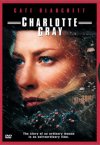BUY THE DVD:
|


|
|
|
SYNOPSIS:
| |
a young scottish woman joins the french resistance during world war ii to rescue her royal air force boyfriend who is lost in france.
|
|
|
MOVIE FACT:
| |
the schoolteacher played by Anton Lesser was called "benech" in the novel, but the small french town in which much of the movie was based had a popular mayor whose name was similar, so officials asked that the name be changed.
|
|
|
RATING:
|


two out of four possible stars
|
|
|
|
Charlotte Gray is missing the fire and excitement usually present in wartime films, but Cate Blanchett is marvelous nonetheless. Her ability to create a character that eclipses all the actors who share the screen with her shows up again in this film. Given that the film takes place during the second world war, in the south of France where the Vichy government ruled the "cooperative" side of France, the emotion in the film should have been more intense. But many of the performances seem muted and the stakes are never high enough. There are too few scenes that place the heroine in danger and she doesn't bear the brunt of enough conflict.
And although Cate is by far the owner of the best performance in the film, her co-stars are guilty only of performing a weak script. The screenwriter, Jeremy Brock looks to have taken a soft approach to the story. The most important word to remember when creating a screenplay is conflict, and in Charlotte Gray, there just isn't enough of it. What the film is almost desperately missing is a good tearjerker scene. The emotion of these character is never high enough and since the film doesn't include time spent on the front lines or other high intensity scenes, some emotional exchanges between Charlotte and her co-stars would have been welcome.
And although Cate's character does have a few good dialogue exchanges, and even raises her voice in a few scenes, the energy level falls so low during some spots that the film never regains the momentum it might have had. Viewers of this story should have sat with their hearts beating rapidly, wondering if Charlotte would be able to find her lost Royal Air Force lover and extricate herself from France alive. But the audience never feels real danger for Charlotte. Again, it's as if any danger that might be present was muted. The danger just isn't there. This problem might have stemmed from the unsuitability of the original novel being transferred to the screen. Not all novels merge well into cinema and from the type of comments people have made about the book, the film just doesn't match its suspense.
But strangely, given all these faults, Charlotte Gray is a well-made film. The performances are all that they could have been and the cinematography is incredible, to say the least. The opening shot, of a train crossing a viaduct through a lush Scottish valley would have been picked directly out of someone's imagination, if the whole thing hadn't been completely real. And the time spent in France is eye-catching as well. Multiple shots of ancient Gallic buildings and towns that have existed for hundreds of years litter every frame. The scenery is a good backdrop, and something that allows the audience to keep interested in the movie. If anything, France itself is a character in the film, as the buildings so effect what occurs in Charlotte's life.
And for all the lack of conflict and real danger for the characters, it is hard to not care what happens to each of them. This is probably the result of some good casting, but this film's easy to watch. And as impossible as it seems, the film never truly drags either. That missing element of frenetic excitement might doom another movie, but Charlotte Gray is a film that fights to get to the finish line, with all the audience members intact. It is probably a combination of the performances and the cinematography that get us to the closing credits. Michael Gambon, for one, gives a heartfelt performance and his character is very endearing. And Rupert Penry-Jones gives the audience a memorable character in his few scenes with Cate Blanchett.
And James Fleet also has an engrossing performances as one of the evil characters of the film. If anything, Fleet's "Richard Cannerley" is more dangerous to Charlotte than any of the nameless German soldiers in the film. Possibly the only performance that could have used something more would be Billy Crudup's portrayal as Charlotte's French love interest, "Julien Levade," suffers from being too American on screen. It is a challenge to believe that Crudup is a Frenchman, and that could be because he doesn't bear a trace of a French accent.
Now, since this film was done in English, one has to forget that they're speaking a different language than they really would have. But Crudup could have lost some of his American accent and made his character seem like he really belonged there. And so Charlotte Gray, with its incredible cinematography, and performances that were, for the most part, on target, is a victim of its own screenplay. It is a good effort by Gillian Armstrong to bring an interesting story to the screen, but it should have included more raw drama to spice it up.
Review by Kelsey Wyatt.
| |
|